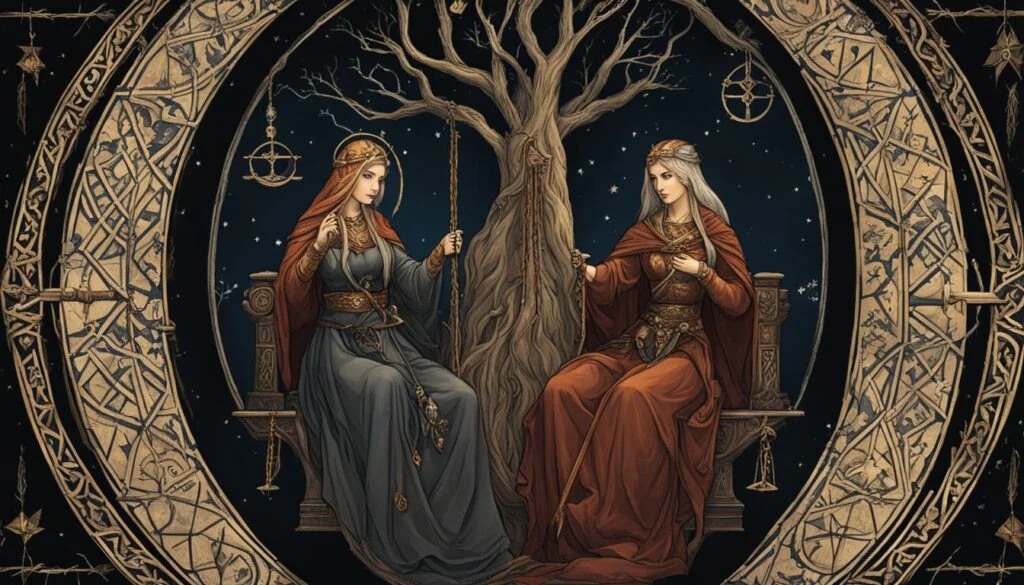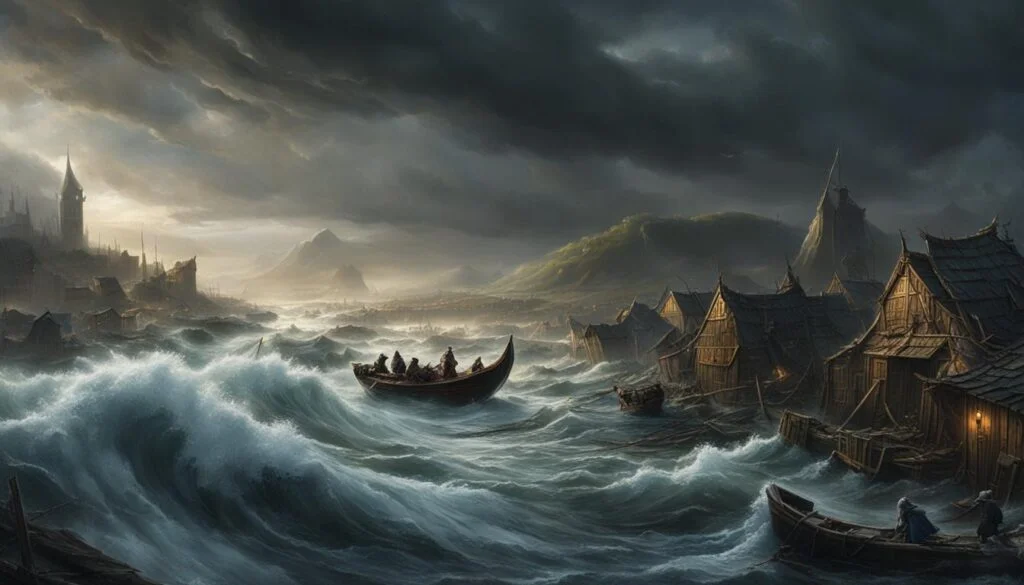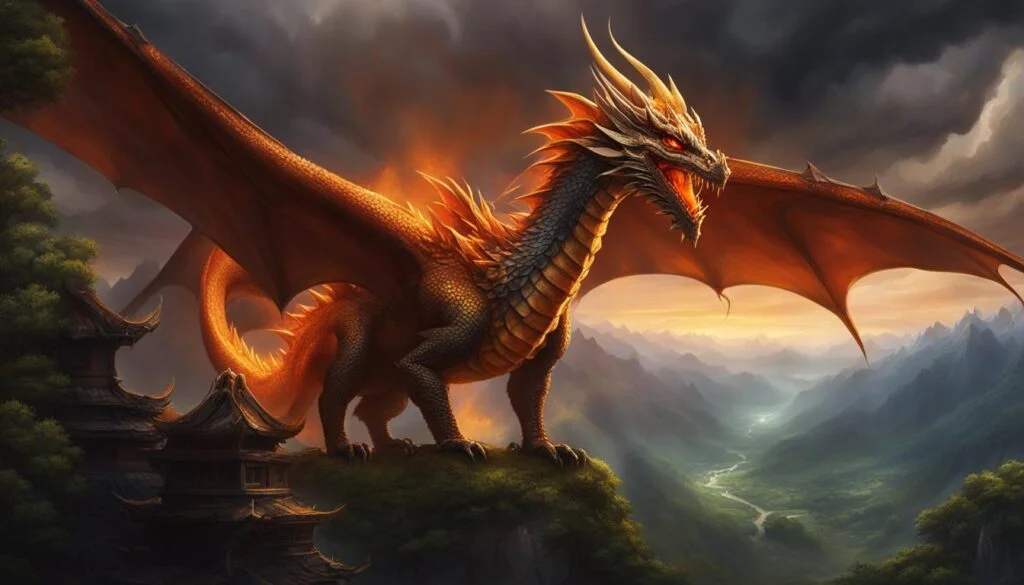Welcome to our exploration of Norse mythology, where we delve into the fascinating world of the Norns. These powerful maiden giantesses, originating from Jötunheimr, hold the key to shaping the destinies of gods and humans alike. Known for their ability to weave the threads of fate, the Norns play an integral role in the intricate tapestry of Norse mythology.
The Norns, whose name may derive from a word meaning “to twine,” arrived from Jötunheimr, signaling the end of the golden age of the gods. As primordial beings, their influence can be both malevolent and benevolent, casting a profound impact on the lives they touch.
Key Takeaways:
- The Norns are deities in Norse mythology responsible for shaping the course of human destinies.
- Their ability to weave the thread of fate gives them immense power over the lives of gods and mortals.
- The Norns are represented by three primary figures: Urðr (Wyrd), Verðandi, and Skuld, symbolizing the past, present, and future respectively.
- Their influence is deeply ingrained in Norse culture and is reflected in various Old Norse texts.
- The role of the Norns in Norse society extends to the control of newborn children’s destinies, marking them as powerful figures in the lives of mortals.
The Role and Significance of Norns in Norse Mythology
The Norns occupy a vital position within Norse mythology, as they possess the power to shape the destinies of both gods and humans. These powerful female beings are responsible for weaving the threads of fate, intricately determining the length and trajectory of each individual’s existence. Unlike passive observers, the Norns actively participate in the tapestry of existence, serving as agents of consequence for the actions and choices of gods and men alike.
The influence of the Norns extends far beyond divination; they are actively engaged in shaping the lives of beings within the vast realm of Norse mythology. Through their intricate interweaving of destinies, they confront both gods and mortals, presenting them with the outcomes of their deeds and decisions. This active participation underscores the profound significance of the Norns, elevating them beyond mere fortune-tellers and positioning them as paramount forces within the Norse mythological pantheon.
With their unyielding power over fate, the Norns exemplify the interconnectedness of all beings and the delicate equilibrium of the cosmos. By diligently crafting the course of events, they personify the intricate balance between divinity and humanity, manifesting the implications of actions and consequences within Norse mythology.
The Weavers of Destiny
- Through weaving the threads of fate, the Norns determine the length and course of each individual’s existence.
- They actively participate in the tapestry of existence, underscoring the consequences of the actions and choices made by gods and men.
- The Norns’ influence transcends mere divination, actively shaping the lives of beings in the Norse mythological realm.
- Their existence highlights the interconnectedness of all beings and the profound importance of their role in maintaining cosmic equilibrium.
Norns in Old Norse Verb and Norse Lore
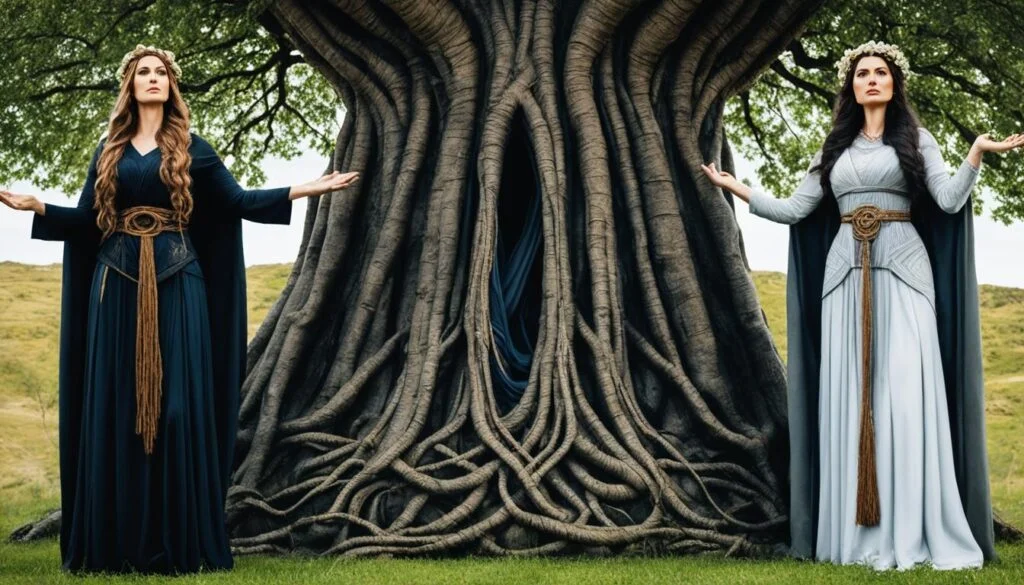
The term Norn has its roots in Old Norse, reflecting the linguistic connection between the Norns and the ancient Norse culture. References to these divine figures can be found in various Old Norse texts, including the Prose Edda and the Poetic Edda. The Norns symbolize the deeply ingrained belief in predestination and the interconnectedness of the past, present, and future in Norse mythology. They are regarded as goddesses of fate and destiny, playing a pivotal role in shaping the lives of gods and mortals.
The Significance of Old Norse References
The Norns’ presence in Old Norse texts highlights their significance in Norse mythology. These ancient writings provide valuable insights into the Norse culture and belief system, emphasizing the important role the Norns played as divine entities.
In the Prose Edda, written by the Icelandic scholar Snorri Sturluson in the 13th century, the Norns are portrayed as powerful beings who govern the threads of fate. Their influence extends beyond the mortal realm, shaping the destinies of gods, heroes, and ordinary individuals.
The Poetic Edda, a collection of Old Norse poems dating back to the 13th century, features poetic descriptions of the Norns and their role in the cosmic order. These verses showcase the Norns’ connection to the concept of fate and their involvement in the lives of gods and mortals alike.
The Norns as Goddesses of Fate and Destiny
In Norse mythology, the Norns hold the esteemed status of goddesses, embodying the forces that govern fate and destiny. Through their intricate weaving of the threads of life, they shape the path of each individual and influence the unfolding of events in both the divine and mortal realms. As goddesses, the Norns possess immense power and wisdom, wielding their authority over the past, present, and future.
The Norns’ role as goddesses of fate and destiny highlights the deeply rooted belief in predestination within Norse mythology. Their presence serves to remind mortals and gods alike of the inescapable nature of destiny and the interconnectedness of all beings.
Norns: Goddesses of Fate and Destiny
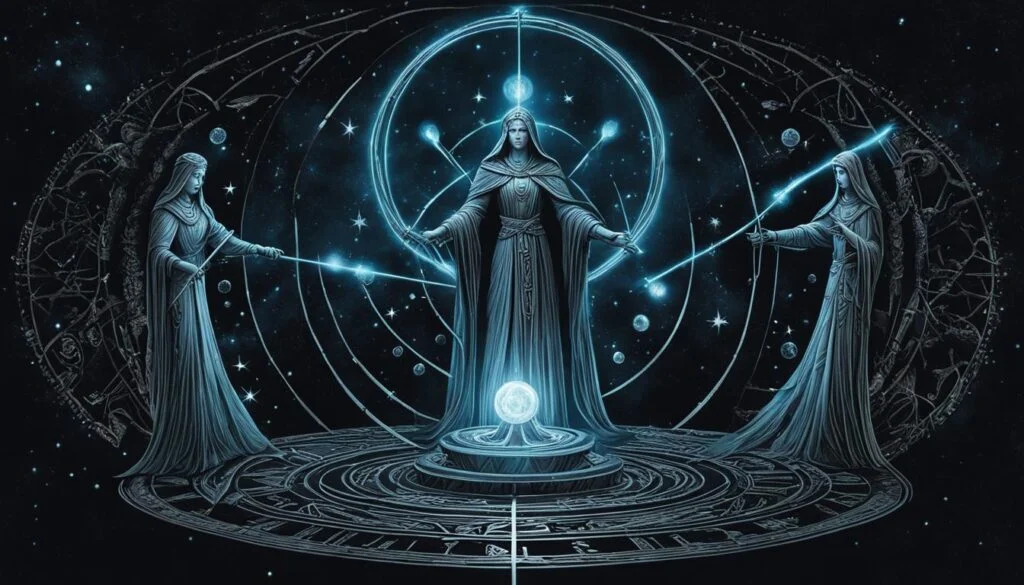
Elevated to the status of divine entities, the Norns symbolize the forces governing fate and destiny in Norse mythology. Urd, Verdandi, and Skuld, the three primary Norns, respectively represent the past, present, and future.
Through their intricate knowledge and mystical abilities, they continuously shape the lives of both gods and mortals, leaving an indelible mark on the unfolding of events and the cosmic order. As a central theme in Norse mythology, the role and significance of the Norns provide a profound understanding of the deeply rooted belief in fate, destiny, and the interconnectedness of all beings.
Urd, the Norn of the past, holds the wisdom of history and informs the present through memories and accumulated knowledge. Verdandi, the Norn of the present, emphasizes the importance of seizing opportunities and making conscious choices in the here and now. Skuld, the Norn of the future, possesses the power of prophecy and shapes the events yet to come.
Together, the Norns form an inseparable trio, representing the interconnectedness of time and the inexorable nature of fate, weaving the threads of destiny for all beings in the Norse mythological realm.
The Three Norns
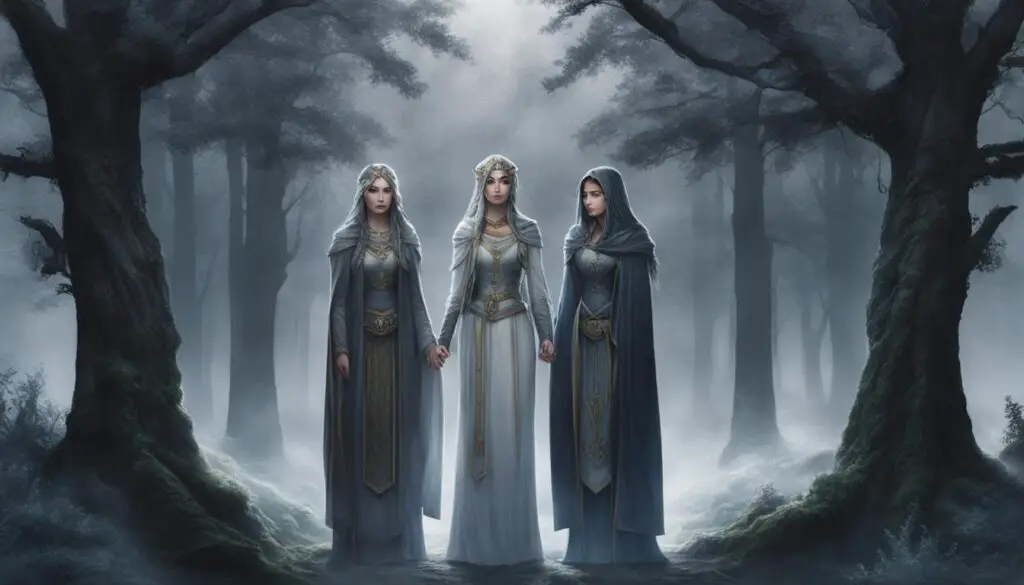
In Norse mythology, the Norns are depicted as three powerful sisters who hold the fate of gods and humans in their hands. Each Norn represents a different aspect of time and destiny. Urd, the eldest sister, governs the past and is associated with memory and the accumulated wisdom of history. Verdandi, the middle sister, embodies the present and symbolizes the importance of seizing opportunities in the here and now. Lastly, Skuld, the youngest sister, shapes the future with her power of prophecy and determination of events yet to come.
Together, Urd, Verdandi, and Skuld form a collective force that weaves the intricate tapestry of time. Their interconnection highlights the inexorable nature of fate and the integral role they play in shaping the destinies of gods and mortals alike.
Norns in Norse Mythology
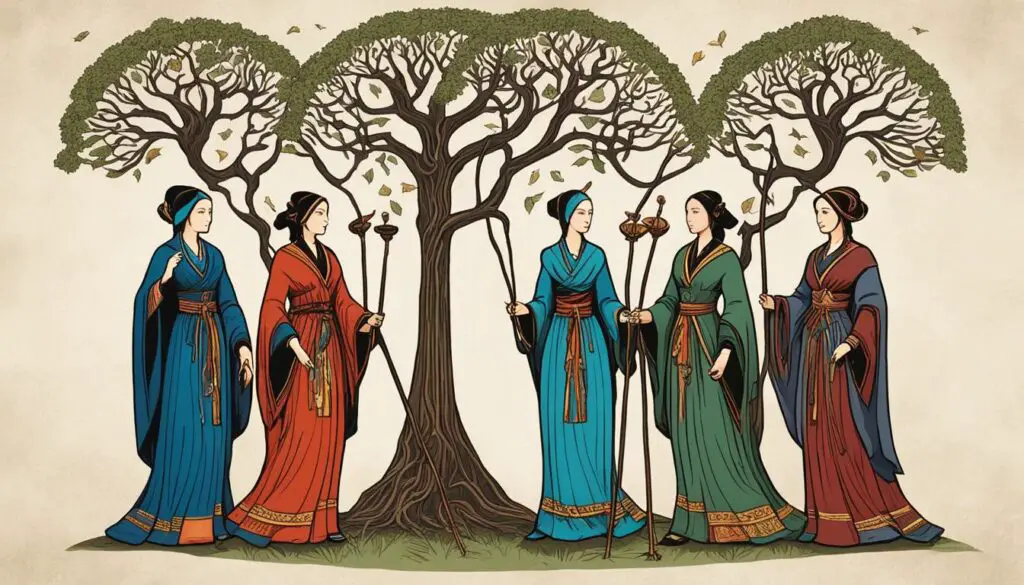
The Norns play a significant role in Norse mythology, holding the power to determine the fate and future of the gods. They reside beneath the World Tree, Yggdrasil, and draw their power from the sacred Well of Urðarbrunnr. This connection to Yggdrasil represents their integral role in maintaining the delicate balance of the cosmos.
The Norns are responsible for caring for the swans that reside at the well, symbolizing their connection to divine wisdom and prophecy. It is at this well that they bestow blessings or pronounce fateful decrees upon gods and mortals alike, shaping the course of their lives.
Their influence extends beyond mere divination, as they actively participate in the unfolding of events and confront both gods and men with the consequences of their actions. The Norns’ power to shape destiny permeates every aspect of Norse mythology, highlighting the deeply-rooted belief in the interconnectedness of all beings and the forces that govern fate and destiny.
Norns in Popular Culture
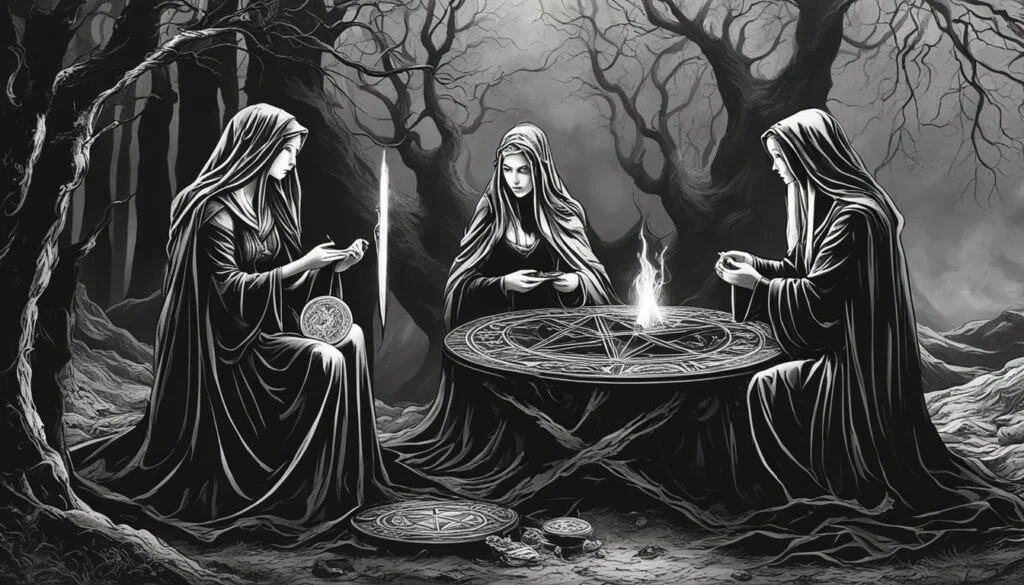
The Norns, with their captivating nature and significant role as weavers of fate, have made a lasting impact on popular culture. They have transcended the pages of Norse mythology and made appearances in various forms of entertainment and artistic expression, including literature, art, and entertainment.
In literature, the Norns’ enigmatic presence and their ability to shape destinies have inspired countless authors. Their names, Urðr, Verðandi, and Skuld, have become synonymous with the concept of fate and have been referenced in numerous works of fiction.
Artists, too, have been captivated by the allure of the Norns. Their intricate knowledge and intricate abilities have been depicted in paintings, sculptures, and other visual mediums, bringing these powerful beings to life for all to see and admire.
In the world of entertainment, the Norns have found their place as captivating characters. One notable example is the popular video game franchise, God of War. In the game, Skuld, one of the Norns, represents the concept of fate and destiny, adding a layer of mystique and depth to the narrative.
The enduring presence of the Norns in popular culture reflects the timeless fascination with their role as weavers of fate. Their influence on literature, art, and entertainment continues to captivate audiences, ensuring that the legacy of the Norns will endure for generations to come.
The Influence of Norns in Norse Society
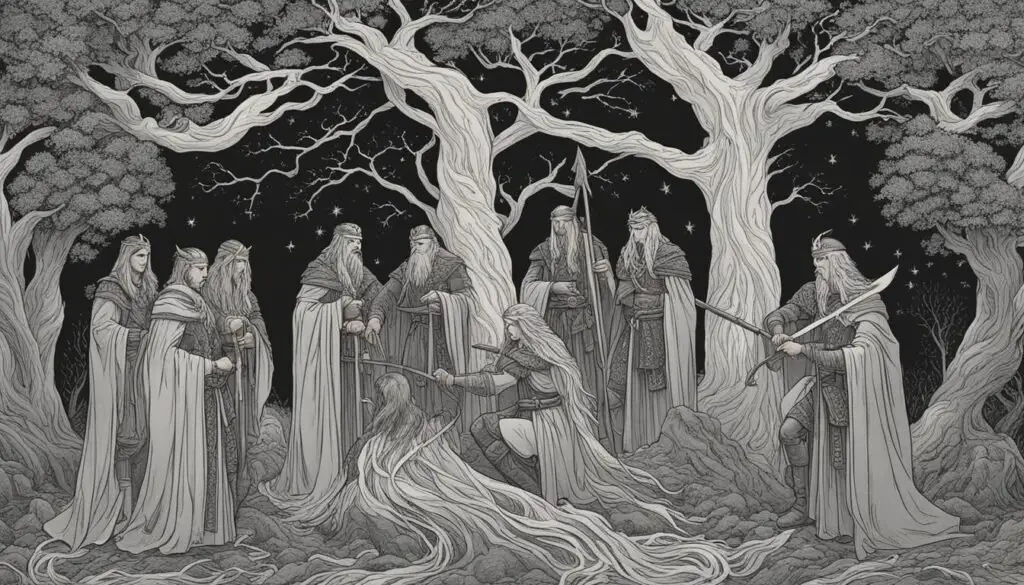
The Norns held a significant role in Norse society, exerting their influence over the lives and choices of mortals. As the weavers of fate, they were believed to have control over the threads that determined the destinies of newborn children. Once the Norns had intervened, no supplications or sacrifices could alter their decisions. Their immense power extended beyond the realm of gods and impacted the lives of mortals, guiding individuals along predestined paths and shaping the course of events. Their presence resonated in every aspect of existence, from individual destinies to the collective fate of Norse society.
The Sealing of Destiny
According to Norse belief, the Norns sealed the destinies of newborn children by weaving their threads of fate. These threads represented the path that each individual would follow throughout their lives. Once the Norns had woven the tapestry of fate, it became unchangeable. No prayers, supplications, or sacrifices could alter the course of a person’s life as determined by the Norns. This belief instilled a sense of resignation and acceptance of one’s predetermined fate among the Norse people.
Guiding Mortals Along Predestined Paths
The Norns’ influence extended to the lives of mortals, actively guiding them along predetermined paths. They possessed a deep understanding of the intricacies of fate and orchestrated the events unfolding in individuals’ lives. Mortals had to navigate their existence within the boundaries set by the Norns, as deviating from their predetermined paths would invite dire consequences.
Shaping the Course of Events
The influence of the Norns was not limited to individual destinies alone. They played a pivotal role in shaping the course of events in Norse society at large. Their actions and decisions had far-reaching consequences that affected the collective fate of the community. The Norns’ judgment and interventions were seen as integral to maintaining cosmic order and ensuring the proper functioning of the Norse world.
The profound influence of the Norns on both individual lives and the collective destiny of Norse society cemented their status as revered and feared divine entities. The belief in their power to shape and control fate permeated all aspects of Norse culture and left an indelible mark on the society’s worldview.
The Role of Norns in Norse Legends
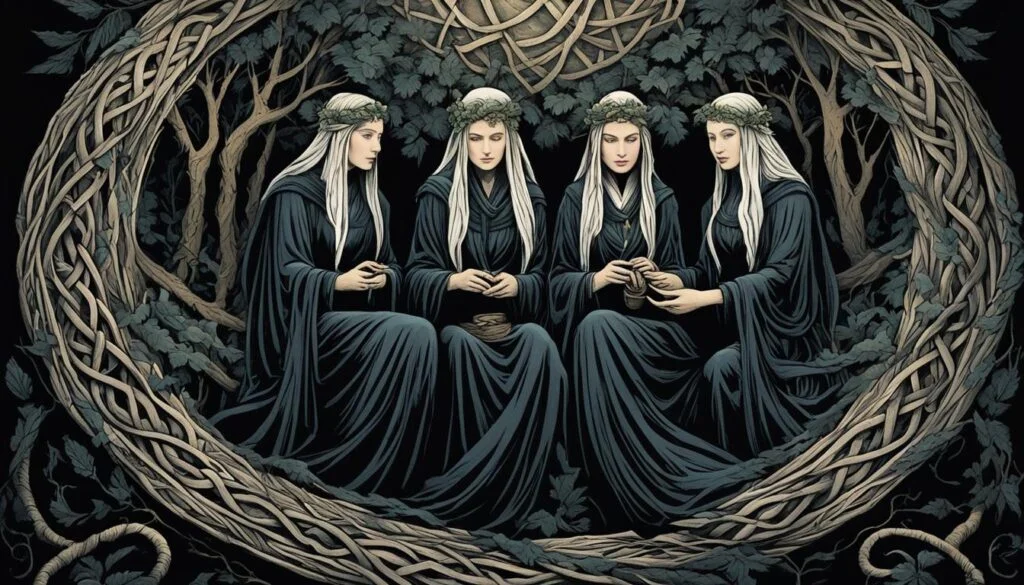
Throughout the Nordic sagas, the Norns play a significant role in shaping the destinies of gods and mortals. These powerful and mystical beings appear in various forms, bestowing their cryptic wisdom upon those they encounter. Sometimes, they directly intervene in the lives of gods and mortals, altering the course of events.
Consulted by gods and goddesses seeking knowledge of their future, the Norns hold the key to unlocking the mysteries of fate and destiny. Their appearances in dreams and premonitions are significant moments in the legends, indicating that important events are about to unfold.
Despite the occasional ambiguity in their role, the Norns are both respected and feared. They possess immense power over the destinies of both gods and mortals, and their influence is often irreversible. The unpredictability of the Norns exemplifies the complex nature of life in Norse mythology, where the strands of fate are constantly intertwined with mortal choices and divine intervention.
In Norse legends, the Norns hold the key to the intricate tapestry of existence, their actions and decisions shaping the course of events. As we explore the myths and stories of Norse mythology, we come to understand the profound significance of the Norns and their enduring role in the cosmic order.
Conclusion
The Norns, with their power to shape the destinies of gods and mortals, hold a central role in Norse mythology. As the weavers of fate and destiny, they are revered and feared for their ability to determine the course of events. The Norns’ influence is deeply intertwined with the cosmic order and the belief in predestination.
Throughout Norse society, the Norns’ presence is palpable, guiding the lives of individuals and sealing the fates of newborn children. Their power cannot be altered or swayed, cementing their importance in the lives of mortals. In Nordic sagas, their appearances and cryptic wisdom add a sense of mystery and significance to the legends.
The enduring legacy of the Norns is evident in popular culture, where they continue to captivate audiences with their enigmatic nature as weavers of fate. Their influence reflects the timeless fascination with their role in the interconnectedness of all beings. The Norns embody the deeply rooted belief in fate and the intricate tapestry of Norse mythology.
FAQ
Who are the Norns in Norse mythology?
The Norns are deities in Norse mythology responsible for shaping the course of human destinies.
What is the role and significance of Norns in Norse mythology?
The Norns hold immense importance in Norse mythology as they have the power to shape the destinies of both gods and humans.
What is the meaning of the word “norn” in Norse mythology?
The name “norn” may derive from a word meaning “to twine” and refers to their ability to weave the thread of fate.
What are the names of the three primary Norns?
The three primary Norns are Urðr (Wyrd), Verðandi, and Skuld, representing past, present, and future respectively.
How do the Norns shape the lives of gods and mortals?
The Norns actively participate in the tapestry of existence, confronting both gods and humans with the consequences of their actions and choices.
Where can references to the Norns be found in Norse mythology?
References to the Norns can be found in various Old Norse texts, including the Prose Edda and the Poetic Edda.
What do the Norns symbolize in Norse mythology?
The Norns symbolize the deeply ingrained belief in predestination and the interconnectedness of the past, present, and future.
What are the Norns associated with in Norse mythology?
The Norns are associated with the Well of Urðarbrunnr, which is a source of their power, and Yggdrasil, the World Tree.
How do the Norns appear in popular culture?
The Norns have appeared in various forms of entertainment, such as literature, art, and video games, captivating audiences with their role as weavers of fate.
How did the Norns influence Norse society?
The Norns were believed to control the threads of fate and seal the destinies of newborn children, actively shaping the lives of mortals.
What is the role of the Norns in Norse legends?
In Norse legends, the Norns appear in various forms, bestowing wisdom, prophesying, and intervening in the lives of gods and mortals.


